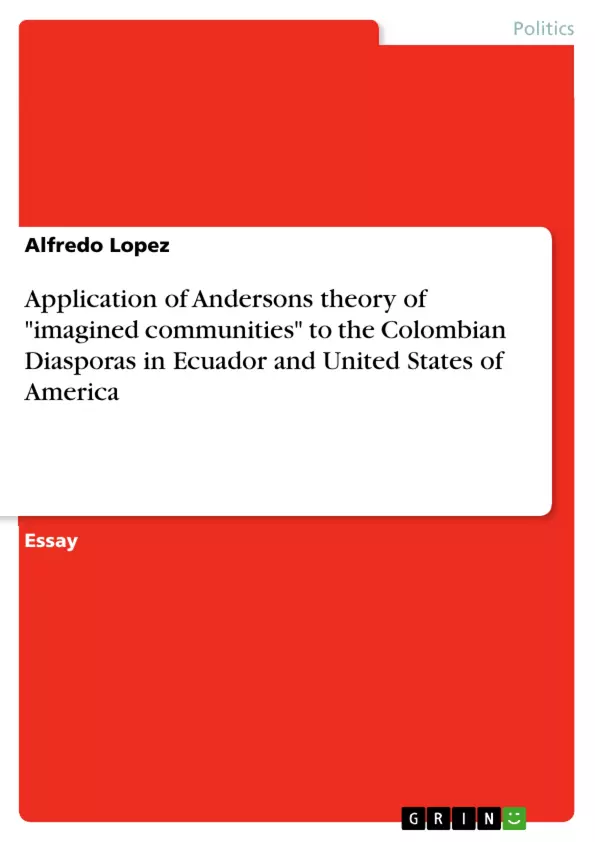This essay discusses and analyses briefly the theory by Benedict Anderson of "imagined communities" and the theory of "scapes" by Arjun Appadurai. After that, these theories by Anderson and Appadurai will be applied to the Colombian Diasporas in Ecuador and United States of America. Finally, the conclusion of this essay will display a summary of how Colombian Diasporas have created their own identity according to Anderson and Appadurai theories.
Nowadays, there are many Diasporas scattered around the world. All of them have their own identity, culture and thoughts. It could be said that Diasporas have been formed by migration of tourists, refugees, expatriates, occasional workers, communities and overseas exile. Although Diasporas differ in culture, beliefs, background and thoughts, all have things in common such as a clear vision of their homeland, their feeling of belongingness to their homeland, their hopefulness to return to their country and their willingness of keeping their cultures and traditions. Due to those reasons, diaspora communities create their own identity which distinguishes them from other Diasporas. But the question is, why diaspora communities create their own identity abroad. Could the ideas of Benedict Anderson and Arjun Appadurai provide a clear explanation of this issue?
Inhaltsverzeichnis (Table of Contents)
- Application of the theory of "imagined communities" to the Colombian Diasporas in Ecuador and United States of America
- Theories of Anderson and Appadurai
- Imagined Communities
- Scapes
- Colombian Diasporas
- African Diasporas in Colombia
- Colombian Diaspora in Ecuador
- Colombian Diaspora in the United States
Zielsetzung und Themenschwerpunkte (Objectives and Key Themes)
This essay explores the formation of identity in Colombian diasporas, particularly in Ecuador and the United States, through the lens of Benedict Anderson's theory of "imagined communities" and Arjun Appadurai's theory of "scapes." It aims to analyze how these theories can explain the ways in which Colombian diasporas construct their own identities while living abroad.
- The concept of "imagined communities" and its application to diasporas.
- The role of "scapes" in shaping cultural experiences and identity formation.
- The creation of a distinct identity within Colombian diasporas in Ecuador and the United States.
- The impact of political and social realities on the experience of Colombian diasporas.
- The significance of cultural preservation and transmission within diasporic communities.
Zusammenfassung der Kapitel (Chapter Summaries)
- The essay begins by introducing the concept of "imagined communities" as developed by Benedict Anderson, highlighting the notion that nations are imagined political entities that foster a sense of belonging among their members, even if they have never met. Anderson emphasizes the importance of shared experiences, traditions, and narratives in shaping national identity.
- The essay then explores Arjun Appadurai's theory of "scapes," which posits that global culture is composed of interconnected realms like ethnoscapes, mediascapes, technoscapes, finanscapes, and ideoscapes. These realms contribute to the shaping of global consciousness and influence how individuals perceive the world.
- The essay further examines the African diaspora in Colombia, highlighting how their preservation of African culture and traditions despite their birth and upbringing in Colombia reflects the principles of imagined communities and scapes. Their strong sense of connection to Africa, even in the absence of direct experience, exemplifies Anderson's concept of imagined communities.
- The essay then delves into the Colombian diaspora in Ecuador, discussing the challenges and complexities faced by Colombians seeking refuge and asylum due to the decades-long armed conflict in Colombia. It emphasizes how the political separation of Ecuador and Colombia has led to a sense of imagined national boundaries that contribute to social tensions and discrimination against Colombians in Ecuador.
Schlüsselwörter (Keywords)
The essay focuses on the key concepts of "imagined communities," "scapes," diaspora identity, Colombian diaspora, Ecuador, the United States, cultural preservation, political conflict, social discrimination, and national boundaries. These keywords highlight the core themes of the essay, exploring how these concepts intersect in shaping the experiences of Colombian diasporas in different global contexts.
- Quote paper
- Alfredo Lopez (Author), 2016, Application of Andersons theory of "imagined communities" to the Colombian Diasporas in Ecuador and United States of America, Munich, GRIN Verlag, https://www.grin.com/document/470305



